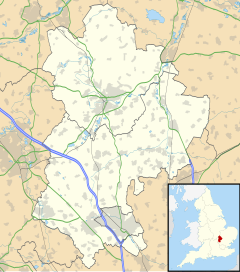|
Milton Bryan
Milton Bryan is a village and civil parish located in Central Bedfordshire (the spelling Milton Bryant was previously common and is still recognised by postal services). It lies just off the A4012 road, near to its junction with the A5 at Hockliffe. The parish includes the ancient hamlets of Potsgrove & Battlesden. The village is best known for being the birthplace of Joseph Paxton, the designer of the Crystal Palace, who was born in Milton Bryan as the seventh son[citation needed] of a farming family along with its role in the Second World War. South EndThe village is divided into two distinct areas: Church End and South End. South End includes the Red Lion pub and an attractive duck pond. A Methodist Chapel was built by the pond in the 19th century, resting on the banks of the pond and overhanging the pond supported on stilts. Church EndChurch End includes St Peter's Church and the remains of a radio station (Soldatensender Calais) built in the Second World War to broadcast 'black propaganda' into Nazi Germany.[2] St Peter's ChurchSt Peter's Church was initially a simple Norman structure with a chancel, nave and small timber bell turret, with a 15th-century east window, windows in the nave and doorways in chancel and nave. Then the Inglis family acquired the Milton Bryan Estate through marriage in 1784. The first major alterations took place in 1826 in memory of Sir Hugh Inglis, who had died in 1820, by his son Sir Robert Harry Inglis. A north transept was built and a family chapel over a vault, the architect seems to have been Sir Robert Smirke. A new tower and a porch were built in 1840-1841, designed by Lewis Nockalls Cottingham, the west window was reopened and a new west front gable were added. Ten years later a south transept was added at Sir Robert Harry Inglis' expense, after his death a stained glass window was installed in the north transept in 1857. Lady Paxton gave a stained glass window in 1867 in memory of her husband Sir Joseph Paxton, architect of the Crystal Palace, who was born in the village.[3] PondIn 1861, a chapel was built over the pond, supported by stilts and partially on land. This was a timber Chapel with a slated roof which, at a squash, could seat up to 50 people. The interior was very simple and austere. During its life, the Chapel was maintained meticulously by the villagers who ensured that the pews were kept polished and the wooden floor scrubbed. Very often, the sound of ducks under the Chapel could be heard during the sermons and hymns. A plaque was placed by the pond to commemorate both the Millennium 2000 and the site of the former Milton Bryan Methodist Chapel. Surrounding areaThe nearest town to Milton Bryan is Leighton Buzzard, closely followed by Dunstable. It is also a short distance away from the villages of Toddington[4] and Woburn. References
External links
|
||||||||||||||||||||||||||||||||||||||||
Portal di Ensiklopedia Dunia

